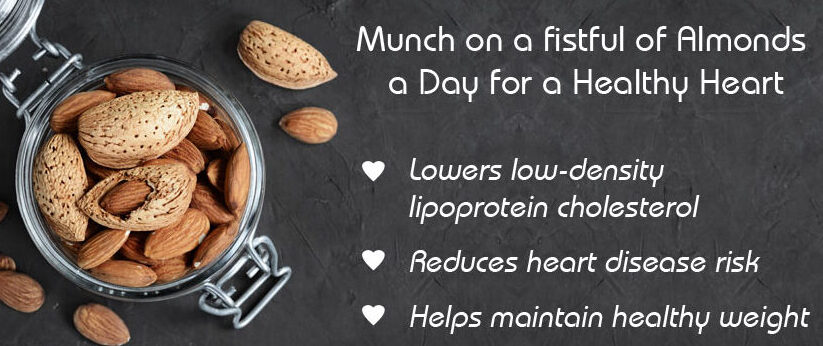Introduction
Almonds include nutrients that provide a number of health benefits, including strengthening bones, promoting heart health, and preventing cancer. However, not everyone may benefit from these nuts. It can be added to savory or sweet meals or eaten raw or toast as a snack. They can also be bought as wheat flour, oil, butter, milk, sliced, flaked, or slivered. These are seeds, not nuts, despite the fact that people refer to them as such. Almonds have a remarkable nutritional makeup. An ounce (oz) or twenty-eight grams (g) of nuts contains:
- 3.5 g of fiber
- 6 grams of protein
- 27 percent of daily value is potassium
- 18 percent of the daily value is magnesium
- 48 percent of the daily value (DV) for vitamin E
- 14 grams of fat, nine of that are monounsaturated
- Sufficient levels of phosphorus, copper, and vitamin B2 (riboflavin)
- All of this from a tiny handful of the almonds, which provide 164 calories and six grams of carbs, of which 3.5 are fiber-rich
Health Benefits
Reduce Cholesterol Level
Elevated blood levels of low-density lipoproteins (LDLs), also known as “bad” cholesterol, have been linked to an increased risk of heart disease. Your diet might have a big impact on your LDL levels. These may aid in lowering LDL, per some research. In a 6-week trial with 107 high-risk participants for cardiovascular disease, it was discovered that an almond-based diet contributing 20% of calories decreased the level of LDL cholesterol by an average of 9.7 mg/dL. High- density lipoproteins (HDLs), and “good” cholesterol, were found to be maintained while LDL cholesterol was reduced by 5.3 mg/dL by ingesting 1.5 oz (42 g) of daily, according to another study. Additionally, participants’ abdominal fat decreased.
Assist With Blood Sugar Control
Nuts are rich in fiber, protein, and good fats but low in carbohydrates. They are therefore the ideal option for those who have diabetes. The high magnesium concentration of these nuts is another advantage. Magnesium is a necessary mineral for more than 300 bodily processes, including blood sugar regulation. A daily intake of 420 mg of magnesium is advised. Furthermore, two ounces of almonds contain around half that quantity, or 153 milligrams of this crucial mineral.

It’s interesting to note that a magnesium deficit is thought to affect at least 25% of individuals with type 2 diabetes. A healthy consumption of magnesium has been linked to a reduced likelihood of developing type 2 diabetes & better control of blood sugar in diabetics.
Improve Gut Health
It may support the immune and overall health of the gastrointestinal (GI) tract, according to recent studies. A stronger physique and a greater immune system are correlated with a healthier stomach.
Keep a Healthy Weight
So long as you watch portion sizes, nuts , despite their high calorie content, may help lower your chance of gaining weight and obesity. Because of their high fiber and protein content, nuts help you feel satisfied faster, which helps you control your calorie intake without compromising hunger.
High in Vitamin E
The group of fat-soluble antioxidants includes vitamin E. Your body’s cell membranes contain these antioxidants, which shield cells from damage caused by oxidation. They are among the best foods on the planet for vitamin E. 48% of them of the DV is provided by just 1 oz. Increased vitamin E intake has been associated in several studies with lower incidence of cancer, heart disease, and Alzheimer’s disease. Still, additional study is required to completely validate these advantages.
Prevent From Heart Disease
Almonds and have the potential to lower blood fat, or lipid, levels. Heart health may benefit from this. Researchers discovered in a 2014 study that eating almonds considerably improved circulation flow, lowered blood pressure, and raised blood levels of antioxidants. All of the participants were healthy guys between the ages of 20 and 70, and they consumed 50 g of almonds daily for four weeks. The researchers think that this could be because of:
- Fiber, good fats like vitamin E, and vitamin E all contribute to feeling full.
- The impact of flavonoids as antioxidants
To get these advantages, they advise consuming a small amount of almonds every day. Heart disease risk is increased by high blood pressure.

Packed With Antioxidants
Almonds are a great antioxidant source. Antioxidants aid in the defense versus oxidative stress, a condition which can harm cell molecules and cause inflammation, aging, and illnesses such as cancer. The dark layer of almond skin contains the majority of the fruit’s potent antioxidants. Because of this, blanched almonds that is, almonds without skin have a lower antioxidant content. This suggests that their anti-inflammatory effects might not be as strong.
In 2022, a comprehensive review of 16 research trials involving more than 800 people revealed that consuming as much as sixty g (around 2.25 ounces) of almonds daily decreased two distinct indicators of inflammation within the body.
Almonds Boost Bone Health
The minerals magnesium, calcium, manganese, the metal copper, vitamin K, zinc, protein, and manganese found in almonds all support healthy bones. Almonds from Trusted Source are a suggested source of these nutrients by experts.
Read More About Another Super Foods
How to Prepare Almonds
Almonds are quite adaptable and convenient, making it simple to include them in your diet. Almonds can be enjoyed in a variety of ways besides just by themselves.
- Savor a bag of almond-studded trail mix
- Almonds taste and feel better after roasting

- Replace other nut butters with almond butter
- When making baked items, use almond flour for regular flour
- Sliced almonds can be added as garnish to salads, cereals, and porridge
- Almonds that have been commercially roasted and seasoned may have less nutritious advantages and more harmful oils.
Allergy
Almonds are not a good choice for anyone allergic to nuts. After eating almonds, if someone develops hives, edema, or trouble breathing, they should get medical attention right away. Anaphylaxis is a disorder that can occur very quickly and pose a serious risk to life. If a person has a known allergy, they should make sure that items in cafes do not include nuts and examine the packaging of prepared foods. The cakes, sweets, savory rice, and a host of other meals and recipes carry the potential to contain nuts.


2 comments